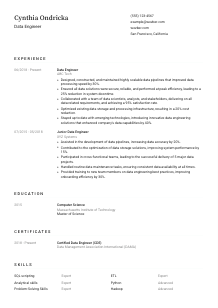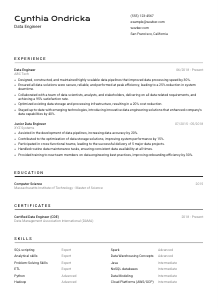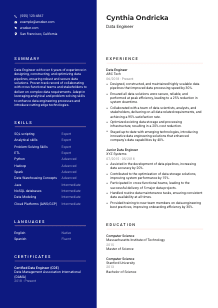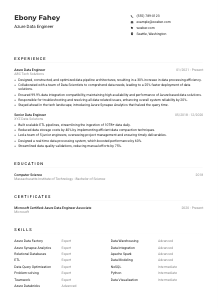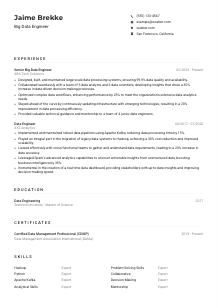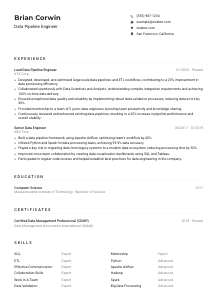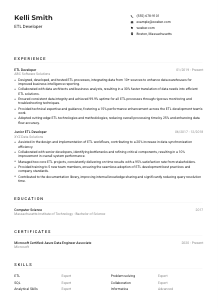Data Engineer CV Example
Building data pipelines, but your CV seems like a data leak? Dive into this Data Engineer CV example, structured with Wozber free CV builder. See how you can architect your data expertise to fit job frameworks, propelling your career with the same efficiency as a well-optimized query!
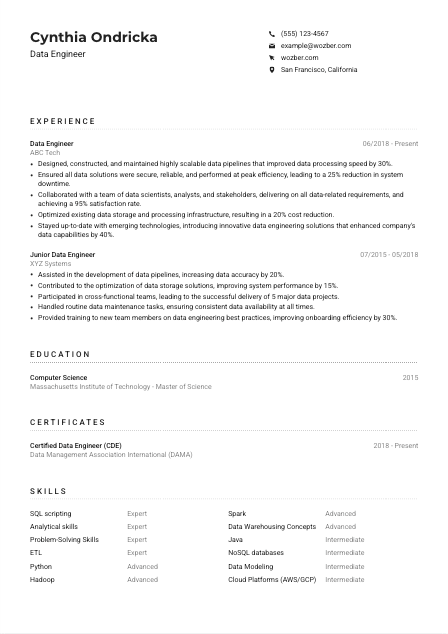
How to write a Data Engineer CV?
Hey there, aspiring Data Engineer! Ready to boost your career with a CV that not only meets the mark but effectively showcases your expertise? With the tech landscape constantly evolving, your CV must stand tall among the rest. Here, we'll guide you through tailor-making your CV, laser-focused on a Data Engineer role.
By capitalizing on the Wozber free CV builder's prowess, you'll craft an ATS-compliant CV that resonates with recruiters. Buckle up as we dive deep into translating your skills and experiences into a compelling data engineer career narrative!
Personal Details
The personal section might be brief, but it's your digital handshake. Let's make it count by aligning it perfectly with what a Data Engineer role entails, ensuring it's polished, professional, and screams 'San Francisco, California'.
1. Boldly State Your Name
Begin with your name, styled in a clear, ATS-friendly font. This is your brand; make sure it's visible at first glance.
2. Position Title Precision
Just below your name, echo the role's title - 'Data Engineer' - to instantly align your personal brand with the target position. This subtle match signals your direct interest and relevance to the hiring manager.
3. Perfecting Contact Details
Include your phone number and a professional email address (think: firstname.lastname@email.com). Double-check for typos to ensure recruiters can reach you without a hitch.
4. Address Alignment
Mention 'San Francisco, California', conforming to the job's geographic prerequisite. This detail clarifies you're in the right locale, or at least prepared to relocate, making the hiring process smoother.
5. Link to Your Professional Online Persona
A LinkedIn profile or personal website that echoes your CV adds depth to your application. Ensure it's accessible and mirrors the refined professional showcased in your CV.
Takeaway
Your personal section is your first interaction with potential employers - make it count. A clean, precise introduction sets the tone for the detailed excellence to follow. Let your personal details confidently state, 'I'm the Data Engineer you're looking for.'





Experience
The experience section is where you shine, showing off your achievements and how they align with being a standout Data Engineer. Here's how to sculpt your experience into an engrossing story of your professional journey.
- Designed, constructed, and maintained highly scalable data pipelines that improved data processing speed by 30%.
- Ensured all data solutions were secure, reliable, and performed at peak efficiency, leading to a 25% reduction in system downtime.
- Collaborated with a team of data scientists, analysts, and stakeholders, delivering on all data‑related requirements, and achieving a 95% satisfaction rate.
- Optimised existing data storage and processing infrastructure, resulting in a 20% cost reduction.
- Stayed up‑to‑date with emerging technologies, introducing innovative data engineering solutions that enhanced company's data capabilities by 40%.
- Assisted in the development of data pipelines, increasing data accuracy by 20%.
- Contributed to the optimisation of data storage solutions, improving system performance by 15%.
- Participated in cross‑functional teams, leading to the successful delivery of 5 major data projects.
- Handled routine data maintenance tasks, ensuring consistent data availability at all times.
- Provided training to new team members on data engineering best practices, improving onboarding efficiency by 30%.
1. Breakdown and Match
Dissect the job requirements, identifying key phrases like 'constructed and maintained scalable data pipelines.' Craft your bullet points to reflect these tasks and accomplishments, demonstrating your direct experience and success in these areas.
2. Company and Position Structure
List your roles in reverse chronological order, beginning with your most recent job. Detailing the company name, your position, and the dates of employment sets a clear, professional timeline of your career.
3. Articulate Achievements
Under each position, create bullet points like 'Designed, constructed, and maintained highly scalable data pipelines, improving data processing speed by 30%.' This quantifies your achievements, providing tangible proof of your impact.
4. Quantify Your Impact
Adding numbers to your successes gives them weight. Whether it's reducing system downtime by 25% or enhancing data capabilities by 40%, these figures catch eyes and prove efficacy.
5. Prioritize Relevance
While all experience is valuable, highlight the most relevant roles and projects. Oversharing can cloud your significant achievements; keep focus sharp on what makes you a prime candidate for a Data Engineer role.
Takeaway
Your experience is your narrative. Craft it to reflect your journey as a Data Engineer thoroughly. With each bullet point, you're not just talking about past roles; you're illustrating why you're the ideal candidate for this job. Show the tangible outcomes your expertise brings and let your experience sing your praises.
Education
For a Data Engineer, specific education in computer science or a related field isn't just important; it's a requirement. Let's tailor your educational background to beam with relevance and authority.
1. Echo the Job's Education Requirements
Directly match your degree with the job's demands. Our job description requires a degree in Computer Science or related fields. If you hold these degrees, place them front and center.
2. Simplify Structure
Maintain clarity with a straightforward layout: degree type, field of study, institution, and graduation date. This format is easy on the eyes and lets essential details shine.
3. Tailor Degree Information
"Master of Science in Computer Science" not only meets but exceeds basic criteria, placing you in a favorable light. List your highest qualification first to emphasize your depth of knowledge.
4. Relevant Courses or Projects
While broader degrees cover most bases, highlighting specific courses or projects related to data engineering can underscore your readiness and passion for the role.
5. Showcase Accomplishments
Graduating with honors, leading a significant project, or involvement in tech clubs demonstrates your commitment beyond coursework. For senior roles, focus on advanced degrees or relevant continuous education.
Takeaway
Your education isn't just about the degrees; it's a testament to your journey into data engineering. Highlight it with precision, directly tying it to the job requirements. Every piece of your educational puzzle should point towards one conclusion: you're immensely qualified for the role of a Data Engineer.
Certificates
In the ever-evolving world of data engineering, certifications are not just accolades; they're proof of your ongoing dedication and skill updating. Here's how these tokens of professional growth can amplify your CV.
1. Reflect on Job Necessity
While certifications weren't explicitly required for our Data Engineer position, they significantly boost your application, demonstrating specialized knowledge and ongoing learning.
2. Choose Pertinent Certifications
Include certifications directly related to the job, like 'Certified Data Engineer.' This prioritization ensures your CV is concise and impactful, spotlighting your dedication to the field.
3. Transparent Timing
Validity periods matter. For certifications like 'Certified Big Data Professional,' listing the acquisition or expiration dates demonstrates your current expertise level and commitment to staying up-to-date.
4. Constantly Evolve
The tech field is dynamic, with new tools and methodologies emerging constantly. Keep learning, keep certifying, and most importantly, keep your CV updated with these advancements.
Takeaway
Let your certifications speak volumes of your zeal for data engineering. They validate your expertise and show a proactive approach to professional development. Display them proudly, letting recruiters know you're not just suitable for the role but are continually enhancing your toolbelt to deliver exceptional results.
Skills
For a Data Engineer, certain skills are non-negotiable. Here's how to display your technical arsenal and analytical acumen, aligning perfectly with what the job demands.
1. Essential Skills Mapping
Extract key skills from the job description, such as 'SQL scripting,' 'ETL,' and 'Python.' These are your foundations, evidencing your capability to meet the job's technical requirements head-on.
2. Prioritization and Organisation
Focus on the skills most relevant to a Data Engineer, categorizing them from 'Expert' to 'Intermediate' proficiency. This organisation keeps your CV tidy and lets the hiring manager quickly gauge your ready-to-use skills.
3. Highlight Soft Skills
While hard skills get the job done, soft skills like 'Analytical Problem-Solving' and 'Collaboration with Cross-Functional Teams' are what make you a well-rounded candidate. Blend these into your skills section to showcase your dynamic capabilities.
Takeaway
Your skills section is a concise exhibition of your professional repertoire. Curate it thoughtfully, ensuring it echoes the job description while portraying you as the solution to the hiring manager's needs. Your arsenal of skills should make the case for you, loud and clear: 'I'm the Data Engineer you've been searching for.'
Languages
In the diverse world of data engineering, being multilingual can open doors to multinational projects and collaborations. Let's ensure your language skills accentuate your global readiness alongside your technical prowess.
1. Job Language Requirement
Start with the basics: the job requires 'Proficiency in English.' Ensure your CV reflects this, ranking English at a 'Native' or 'Fluent' level to meet this fundamental criterion.
2. Showcase Multilingual Skills
If you speak additional languages, list them to emphasize your versatility. Even if not explicitly required, they underscore your ability to navigate global projects and diverse teams.
3. Honest Proficiency Levels
Clarity is key. For each language, specify your proficiency honestly, using terms like 'Fluent' or 'Intermediate.' This transparency sets accurate expectations for your linguistic capabilities.
4. Language Relevance
Consider the role's scope. If the position involves international collaboration or support for global applications, highlighting your language skills can significantly bolster your candidacy.
5. Bridging Communication Gaps
View your multilingual abilities as bridges, connecting you to broader opportunities and experiences. Each language you speak not only adds to your personal growth but enhances your professional appeal in the global data landscape.
Takeaway
Languages are more than just words; they're tools for building connections and understanding diverse perspectives. Embrace your linguistic skills as integral facets of your professional persona, showcasing your readiness for a role that might stretch beyond local borders. They're a testament to your adaptability and eagerness to engage in the global dialogue of data engineering.
Summary
The summary is your CV's headline act, capturing the essence of your professional narrative. Let's tailor it to shout 'Data Engineer' with clarity and conviction, ensuring you grab attention from the get-go.
1. Synthesize the Job Essence
Begin by internalizing the job's core demands. For a Data Engineer, it's about demonstrating your proficiency in constructing data pipelines and ensuring data accuracy. Make sure your summary encapsulates these fundamental aspects.
2. A Strong Opening
Kick off with a crisp statement about your professional identity and experience. For instance, 'Data Engineer with over 6 years of experience in designing and otimizing data pipelines for high-scale applications.'
3. Highlight Your Unique Impact
Pinpoint a few key accomplishments and skills that align with the job's requirements, like 'Ensured data solution security, leading to a 25% reduction in system downtime.' These specifics paint a vivid picture of your capabilities.
4. Brevity is Key
Remember, a summary is a teaser, not a tell-all. Aim for 3-5 lines that encapsulate your expertise, draw intrigue, and encourage further reading of your CV.
Takeaway
Your summary should not only resonate with hiring managers but also confidently state, 'I am the right fit for this Data Engineer role.' By blending your experiences, skills, and achievements into a concise and potent introduction, you set a professional tone that invites deeper engagement with your CV. Make this section the hook that catches their interest and compels them to dive into your detailed qualifications.
Igniting Your Data Engineer Journey
Congratulations! You're now equipped to craft an ATS-compliant CV that's as dynamic and innovative as the field of data engineering itself. Remember, your CV is not just a document; it's a narrative of your professional journey, skills, and potential contributions. Using Wozber's free CV builder, including its ATS-friendly CV templates and ATS CV scanner, you can fine-tune your application to meet the precise needs of your dream job. This is your time to shine, to show the world the unique blend of talent and passion you bring to the table.
Take these insights, craft a CV that makes you proud, and step boldly towards your next data engineering adventure. Your future is calling. Are you ready to answer?

- Bachelor's or Master's degree in Computer Science, Information Systems, or a related field.
- Minimum of 5 years of experience in data engineering or a related field.
- Proficiency with SQL scripting and experience with at least one programming language such as Python or Java.
- Experience with big data platforms such as Hadoop, Spark, or NoSQL databases.
- Strong analytical and problem-solving skills with a focus on data quality and accuracy.
- Proficiency in English required.
- Must be located in San Francisco, California.
- Design, construct, install, test, and maintain highly scalable data pipelines and data processing applications.
- Ensure data solutions are secure, performant, and reliable.
- Collaborate with data scientists, analysts, and stakeholders to understand data needs and deliver on requirements.
- Monitor and optimize data storage and processing infrastructure for efficiency and cost effectiveness.
- Stay updated with emerging technologies and trends in data engineering to offer innovative solutions.





